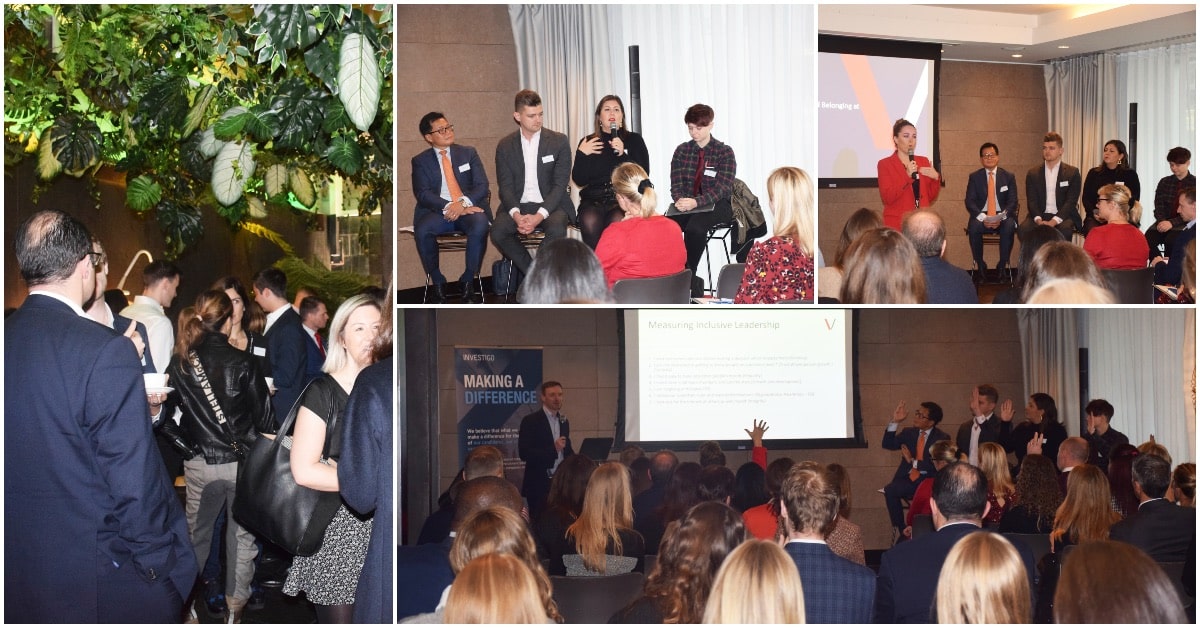
Measuring inclusivity: An insight into Investigo’s latest D&I event
“Diversity is being invited to the party. Inclusion is being asked to dance. Belonging is dancing like nobody is watching.” Verna Myers
What makes an organisation truly inclusive? How do we create a company culture where people feel they belong?
These were the essential questions raised and discussed at our recent Investigo-hosted Diversity and Inclusion event, entitled “Measuring Inclusivity”, on Wednesday 23rd October 2019 at South Place Hotel, London.
Always a hugely popular event, delegates were treated to an insightful and engaging panel discussion with BAME, LGBT+ and gender diverse representatives and allies, chaired by Director of VERCIDA Consulting Dan Robertson.
The breakfast event began with an introduction by Angharad Kenward, Senior Director at Investigo, who set the tone of the interactive morning by asking attendees, “Are we doing enough when it comes to creating inclusive workplaces?” Asking questions, sharing experiences and challenging opinions is at the heart of diversity and inclusion, so everyone was encouraged to get involved in the conversation.
Opening the discussion, expert on workplace inclusion and unconscious bias Dan Robertson presented the principles of inclusive leadership for creating a culture of belonging. These are:
Insight – into yourself and your own experience/conditioning, and insight into those who are different to us
Respect – taking an interest in understanding others on a personal and professional level
Empathy – being in tune with the emotional states of others
Belonging and collaboration – providing an environment of psychological safety where people feel safe to make and learn from mistakes
Empowerment – investing time in everyone not just star players
Integrity – operating in a way that takes the interest of others into account as well as your own.
The question of “What does belonging mean to you?” was then presented to the panel. Vince Voon, Senior Civil Servant for the Home Office Commercial Directorate and voluntary sponsor for BAME initiatives, began by exploring inclusion strategist Verna Myers’ definition of diversity, inclusion and belonging (quoted above):
“You assume BAME employees want to be invited to the party and once there, how do you encourage others at the party to accept them, and how do you ensure everyone, together, has a good time? How do you get them to dance?
“To create a culture of belonging, we need to ask questions of ourselves, of others and of our treatment and opinions of others to avoid assumed understanding”.
Peter Wozny, Corporate Associate at international law firm Brown Rudnick LLP and champion for LGBT+ equality, empathised with this point of assumed understanding, sharing his experience at a previous company where he was treated as a poster boy for the LGBT+ community; he felt he was part of a box ticking exercise.
“For me, an inclusive workplace is somewhere where you can be yourself,” explained Peter. “At Brown Rudnick, I feel accepted and respected for who I am. I do not need to change or conceal who I am in order to fulfil my role or feel I have a place in the organisation”.
Continuing in a similar line of thought, Marie Cuffaro, Director of Investigo Consulting Solutions and Investigo D&I Committee Chair, explained inclusivity as being rooted in authenticity: “You need self-acceptance in order to accept others; inclusive workplaces encourage everyone to be their true selves. Belonging is a result of being accepted, it involves being heard, being seen and being appreciated – no matter your background, gender, sexuality or race”.
Finally, Ash Loakes, Economic Adviser for DEFRA and transgender, non-binary and gender diverse representative for Voices and Influence Partnership, conveyed their experience as a non-binary trans-masculine who also faces the challenge of navigating the working world with autism.
For Ash, belonging is “being treated in line with my needs. DEFRA, in particular, have been incredible in demonstrating care and compassion as an employer, providing stability and structure by aligning my working day to set agendas, partnering me with an autism coach and introducing preferred pronouns in email signatures to avoid assumed gender identity”.
Further topics for discussion and questions from the floor included whether members of the panel had experienced “push back” or resistance to D&I initiatives from leaders or, indeed, from majority groups feeling excluded from D&I networks, the pivotal role of allies in overcoming “othering” and driving inclusive cultures, and intersectionality as the next step on the D&I agenda.
The event concluded with further conversation and networking with many attendees commenting on how insightful the panel discussion had been. All who attended also took away a copy of our accompanying D&I INsight publication, a version of which can be downloaded here.
Keep an eye out for our next D&I event, they’re certainly not to be missed.


